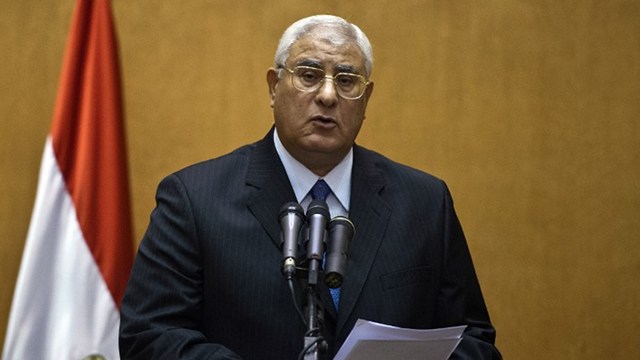SUMMARY
This is AI generated summarization, which may have errors. For context, always refer to the full article.

CAIRO, Egypt – Egypt’s chief justice Adly Mansour was sworn in as interim president on Thursday, July 4, after the army ousted and detained Mohamed Morsi in an abrupt end to the Islamist’s first year in office.
The security forces also rounded up Morsi’s top aides and members of the Muslim Brotherhood movement to which he belongs, sources said.
Morsi’s government unravelled on Wednesday after the army gave him a 48-hour ultimatum in the wake of massive demonstrations since June 30 against his turbulent rule.
As the world debated if the military’s action amounted to a real coup, analysts agreed that Morsi and his Islamist movement brought about their own rapid demise.
“Morsi and the Brotherhood made almost every conceivable mistake… they alienated potential allies, ignored rising discontent, (and) focused more on consolidating their rule than on using what tools they did have,” Nathan Brown wrote on the New Republican website.
Mansour took the oath of office at a ceremony broadcast live from the Supreme Constitutional Court.
Roadmap for political transition
Armed forces chief General Abdel Fattah al-Sisi announced Morsi’s overthrow on state television late Wednesday, citing his inability to end a deepening political crisis.
In his speech, Sisi laid out details of the roadmap for a political transition.
The Islamist-drafted constitution would be frozen and presidential elections held early, he said, without specifying when.
The armed forces, which had deployed troops and armour across Egypt, would “remain far away from politics”.
Mansour, 67, would serve until new elections, according to the army’s plan.
The security forces began arresting leading Brotherhood figures, with state media reporting 300 warrants had been issued.
Saad al-Katatni, head of the ousted president’s Freedom and Justice Party, and the Brotherhood’s deputy supreme guide Rashad Bayoumi were both arrested and taken to prison, the official MENA news agency reported.
A judicial source said arrest warrants had also been issued for Brotherhood supreme leader Mohammed Badie and his first deputy Khairat El-Shater on charges of inciting killings on Sunday outside the movement’s Cairo headquarters.
‘Morsi preventively held’
A senior military officer said the army was “preventively” holding Morsi and that he might face formal charges linked to his prison escape during the revolt that overthrew dictator Hosni Mubarak in 2011.
Morsi had issued a defiant call for supporters to protect his elected “legitimacy”, in a recorded speech hours after the military announced his ouster.
“We had to confront it at some point, this threatening rhetoric,” the officer said. “He succeeded in creating enmity between Egyptians.”
Morsi’s rule was marked by a spiralling economic crisis, shortages of fuel and often deadly opposition protests.
Thousands of protesters dispersed after celebrating wildly through the night at the news of his downfall.
Egypt’s press almost unanimously hailed Morsi’s ouster as a “legitimate” revolution.
“And the people’s revolution was victorious,” read the front page of state-owned Al-Akhbar.
Morsi’s opponents had accused him of failing the 2011 revolution by concentrating power in the hands of his Brotherhood.
His supporters say he inherited many problems from a corrupt regime, and that he should have been allowed to complete his term, which had been due to run until 2016.
World leaders react
US President Barack Obama said he was “deeply concerned” over Morsi’s ouster and urged the army to refrain from “arbitrary arrests”.
In May, Washington approved $1.3 billion in military aid to Egypt. That was now under review, said Obama, as he called for a swift return to democratic rule.
Germany termed Morsi’s ouster by the military as “a major setback for democracy in Egypt”, while Russia called on all Egyptian political forces to “exercise restraint”.
Britain said it will work with the interim authorities despite not supporting the military intervention.
UN chief Ban Ki-moon said civilian rule “should be resumed as soon as possible” and that Egypt’s future should reflect the people’s will, in a statement echoed by NATO.
At least 10 people were killed in clashes in Alexandria and in the southern province of Minya during the night, security officials said.
Already in the week leading up to Morsi’s downfall, at least 50 people died in clashes between his supporters and opponents.
Aside from rounding up members of the Brotherhood, the security forces also turned off broadcasts by the group’s television channel, a Morsi aide told AFP. – Rappler.com
Add a comment
How does this make you feel?
There are no comments yet. Add your comment to start the conversation.